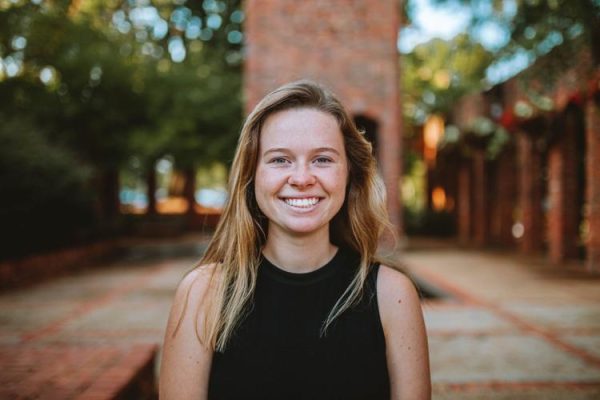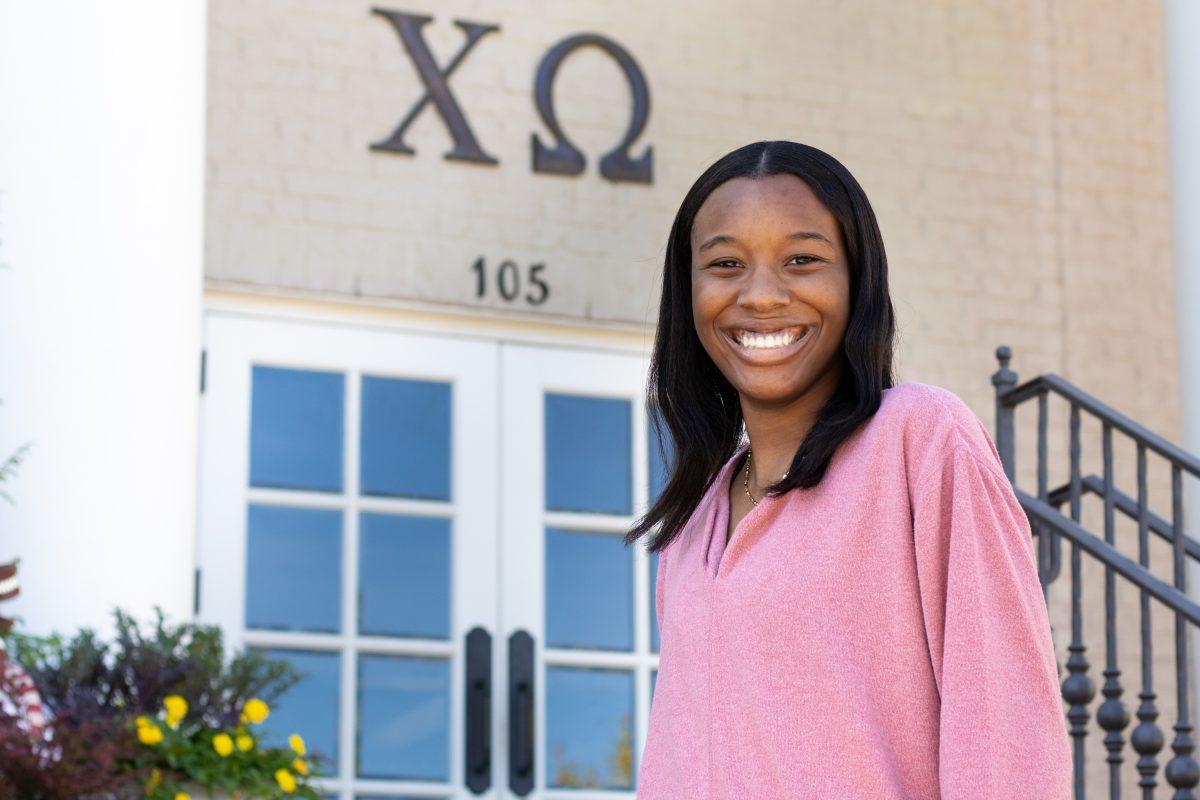In 2018, Raylon Johnson walked into a room of girls who did not look like her. Her first thought was “Why is everyone wearing tennis skirts?” Before that year, she had never even heard of Chi Omega sorority — much less known how to pronounce it. Two years later, she became chapter president, an honor with impact far beyond the cream brick walls of Mississippi State University’s Chi Omega house. She became the first Black president of any Panhellenic sorority in the history of the university.
It is 2021, and even the casual outside observer is able to see that MSU’s Greek life is still largely divided upon racial lines.
At MSU there are four separate Greek councils. Panhellenic Council is comprised of sororities such as Phi Mu, Pi Beta Phi and Chi Omega and, according to data obtained from the Dean of Students’ Office, is 94% white.
National Panhellenic Council is made up of seven of the “Divine Nine” historically Black Greek-letter organizations, including chapters such as Alpha Phi Alpha fraternity, Kappa Alpha Psi fraternity and Sigma Gamma Rho sorority, and is 99% Black.
Interfraternity Council represents MSU’s 16 fraternities, which include names such as Lambda Chi Alpha, Pi Kappa Alpha and Sigma Chi, and is 93% white.
Multicultural Greek Council, which comprises 0.25% of MSU’s Greek life population, represents two Greek-letter organizations — Delta Xi Phi and Sigma Lambda Beta — and has no ethnic majority.
Simply put, Panhellenic sororities and IFC fraternities are white, and National Panhellenic sororities and fraternities are Black.
“I tell people this all the time,” Johnson said. “Greek life is kind of really the only thing that’s still segregated. Like outright, it’s segregated. It’s so obvious.”
She quickly follows this up by saying that it’s not on purpose — of course anyone is allowed to join any group.
If this is the case, then why is Greek life at MSU still so sharply divided along race lines? This question begets many more. What needs to be done to fix this divide? Or, conversely, is this even an issue, or is it just personal preference?
MSU was officially desegregated in 1965, but Greek life did not see integration for decades to come. In 1971, a Chi Omega chapter at Dickinson College attempted to initiate a Black member but was prevented in doing so by the national organization. According to Johnson, Chi Omega at MSU did not have a woman of color in their chapter until 2015.
Jackie Mullen, director of Fraternity and Sorority Life at MSU and the assistant dean of students, said she wishes Greek life on MSU’s campus was more diverse.
“If you are talking about demographics and you’re talking about race, there is, yes, there is a divide when you look at race within our organizations. I would say that in the time that I have been involved, almost 10 years in Greek life, I would say that our organizations have become more inclusive. Is it at the rate that I would like it to be? No,” Mullen said.
Vice President for Access, Diversity & Inclusion Ra’Sheda Boddie-Forbes offered a different perspective. She pointed out that many Greek organizations were originally created to be “identity spaces,” and today still largely resemble the demographic that formed them. When asked if this was good or bad, Boddie-Forbes said it depends.
“I think that for some organizations, for example your NPHC organizations, which are your historically Black organizations, particularly on a predominantly white campus, that being an affinity space for the students may be necessary. And so the push to diversify in terms of race and ethnicity, I don’t think is necessary,” Boddie-Forbes said.
Chi Omega President Johnson, however, disagreed. She said she thinks NPHC should be making more of an effort to diversify their members and thinks it would even help them in many ways.
“I’m not going to lie; it would be harder for a white guy or girl to join a sorority or fraternity at NPHC just because of the culture aspect. It just would be so much harder,” Johnson said. “I would say I applaud IFC and Panhellenic for their recruitment process and how it’s more open. It’s an open process. It’s easier for minorities, if they’re interested in joining, to join. NPHC — it’s harder, it’s more closed off, it’s secretive. It’s just all really secretive so if you don’t already know what’s going on you’re not going to learn what’s going on.”
The first “Divine Nine,” or NPHC Greek-letter organization, Alpha Phi Alpha, was formed in 1906 at Cornell University “by seven college men who recognized the need for a strong bond of brotherhood among African descendants in this country.” At the time, and nearly for another century, Black people would not be allowed to join already-established fraternities and sororities, so they formed their own, and many of these are the historically Black Greek-letter organizations that exist on our campus today.
Shondell Ivy, a senior at MSU and president of NPHC, said anyone is welcome to join NPHC member organizations, but they are not actively recruiting for diversity.
“We see diversity within the students who are interested in us, and that’s the only thing we can do. So it’s not like an active, ‘Oh, we would just want somebody because of the color of their skin.’ We want somebody for their attributes and what they can give to the organization, what can the organization give to them,” Ivy said.
For Johnson, she hardly knew sororities existed outside of the Divine Nine until her boss at the boutique she worked at senior year encouraged her to sign up for Panhellenic recruitment. When Johnson chose to rush a Panhellenic group and not Alpha Kappa Alpha, a Divine Nine group and her mother’s sorority, she knew her mother would be crushed. So she did not tell her.
Johnson said it is funny now, but at the time it created a rift between her and her mother. After she finally told her mother she had rushed Chi O during a family discussion about finances, her mother did not talk to her for two months.
“One of the things I will always remember her saying is ‘I just don’t know why you would do this. They’re not going to look out for you like they would their people, themselves, the same people, because we’re different races.’ She was like ‘You could’ve gone AKA and been the president of the chapter,'” Johnson said about her mother.
Despite the culture shock Johnson first experienced during the Panhellenic rush process, she came to have a fierce love for Chi Omega, something she said she thinks is due to the influence of her mom and her strong Greek loyalties.
Her junior year, Johnson knew she was going to be a member of her sorority’s executive board, but she did not know which position. While she was waiting for the final announcement of the new leadership, all Johnson could hear was her mom’s voice on repeat in her head: “You could have been president at AKA.” Then, when her name flashed on the board beside “president,” she sobbed.
“I don’t think people realize that it’s been a journey,” Johnson said.
Johnson said the key to a more diverse Greek population down the road relies on individuals stepping out of their comfort zone and showing others they can too. Johnson also pointed out several barriers that keep different ethnicities from joining traditionally white Greek life, including cost and the legacy system.
According to Sorority and Fraternity Life Director Mullen, Panhellenic sororities have recently taken several steps to mitigate these issues, including changing their legacy process and reassessing their dues to keep them as low as possible.
Vice President for Access, Diversity & Inclusion Forbes said, to her, the most important thing was a collaboration between councils, rather than diversity within councils. She said students should balance their time between “affinity groups” and stepping out of their comfort zone to get to know those who are different from them.
Mullen said there is a limit to what policies and legislation can accomplish. Ultimately, it is the responsibility of the community to enact change.
“It has to be a community effort. I will say that our organizations have really been so open to this conversation. This is a conversation we continuously are having,” Mullen said.
Correction: Nov. 10, 2021
An earlier version of this story said Alpha Kappa Alpha was the first Divine Nine organization founded. Alpha Kappa Alpha was the first women’s Divine Nine organization founded, and Alpha Phi Alpha was the first Divine Nine organization founded overall.
“Outright, it’s segregated;” A look at Greek life on MSU’s campus
Adam Sullivan | The Reflector
Raylon Johnson, MSU’s first Black president of a Panhellenic sorority, is a member of Chi Omega.
About the Contributor

Hannah Blankenship, Former Editor-in-Chief
Hannah Blankenship served as Editor-in-Chief of The Reflector from 2021 to 2022.
She also served as the Managing Editor from 2020 to 2021 and as the News Editor from 2019 to 2020.
Hannah was named College Journalist of the Year at the 2022 Southeastern Journalism Conference.
0
More to Discover














